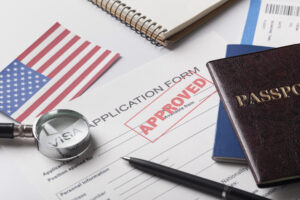Traveling is an exciting adventure, and when it comes to visiting the United States under the Visa Waiver Program (VWP) with an Electronic System for Travel Authorization (ESTA), it’s essential to prioritize your health and well-being. This article aims to provide valuable insights into the importance of health precautions for ESTA travelers, ensuring a safe and enjoyable journey.
We will also cover the following topics:
- Understanding ESTA Travel
- Pre-Travel Medical Consultation
- Essential Vaccinations for ESTA Travelers
- Other Medical Recommendations
Traveling with ESTA
 The ESTA Electronic System for Travel Authorization is an online system implemented by the United States government to determine the eligibility of travelers from Visa Waiver Program (VWP) countries to enter the United States for tourism or business purposes. It is a convenient and streamlined process that allows eligible travelers to obtain travel authorization without the need for a traditional visa.
The ESTA Electronic System for Travel Authorization is an online system implemented by the United States government to determine the eligibility of travelers from Visa Waiver Program (VWP) countries to enter the United States for tourism or business purposes. It is a convenient and streamlined process that allows eligible travelers to obtain travel authorization without the need for a traditional visa.
However, ESTA is not for everyone. There are list of countries that can participate in the program (visa waiver program countries) while other country nationals would have to apply for the USA visa.
Eligibility Criteria for ESTA
To be eligible for ESTA, travelers must be citizens or nationals of VWP countries, possess a valid passport from the participating country, and have a travel purpose that falls under the approved categories. Additionally, they must not have a previously denied visa or a history of immigration violations.
Destinations Covered by ESTA
ESTA allows travelers to visit various popular destinations in the United States, including cities like New York, Los Angeles, San Francisco, and Miami. It covers a wide range of attractions, from iconic landmarks to vibrant cultural scenes, making it a popular choice for tourists and business travelers alike.
ESTA is specifically for entry into the United States and does not grant any travel privileges outside of the country. ESTA is not applicable or valid for travel to destinations outside the United States. If you have an approved ESTA, it only allows you to travel to the United States and stay there for up to 90 days for tourism, business, or transit purposes.
If you plan to travel to other countries outside the United States, you will need to comply with the entry requirements of those specific countries. Each country has its own visa and entry requirements, and ESTA is not relevant or recognized by any other country.
Pre-Travel Medical Consultation
A pre-travel medical consultation is crucial for ESTA travelers to ensure their health and well-being during their trip. It allows individuals to receive personalized medical advice based on their destination, travel activities, and individual health conditions. This consultation helps identify potential health risks, obtain necessary vaccinations, and receive essential medical recommendations to stay healthy while traveling.
Finding a travel medicine specialist

A travel medicine specialist can assess your individual health needs, taking into account factors such as your medical history, current medications, and any underlying conditions. They will tailor their advice to your specific circumstances and provide personalized recommendations to ensure a safe and healthy journey.
One of the key advantages of consulting a travel medicine specialist is their in-depth knowledge of the specific health risks associated with different regions or countries. They can inform you about prevalent diseases, such as malaria, dengue fever, or typhoid, and recommend appropriate preventive measures, such as vaccines, antimalarial medications, or insect repellents. Additionally, they can provide guidance on food and water safety, sun protection, and other precautions to minimize health risks during your trip.
Travel medicine specialists also have access to the most up-to-date information from reputable sources, such as the Centers for Disease Control and Prevention (CDC) or the World Health Organization (WHO). They stay informed about any disease outbreaks, travel advisories, or entry requirements that may affect your travel plans. This ensures that you receive accurate and current information to make informed decisions about your health and safety while traveling.
Information to bring to the consultation

First and foremost, inform the travel medicine specialist about your planned destination or destinations. Different regions of the world pose varying health risks, and specific diseases may be more prevalent in certain areas. By knowing where you intend to travel, the specialist can focus on the health risks specific to those locations and provide targeted advice.
Additionally, provide the duration of your stay in each destination, as this can impact the types of vaccinations or preventive measures recommended. Some vaccines require multiple doses over a specific period, and the timing of these doses may need to be coordinated with your travel plans.
Sharing your detailed itinerary is also essential. If you are visiting multiple destinations or engaging in activities such as hiking, wildlife safaris, or visiting rural areas, the healthcare provider can assess any additional health risks associated with those specific activities. For example, they may recommend specific vaccines or precautions against diseases transmitted by insects or animals.
It is equally important to disclose any pre-existing medical conditions or chronic illnesses. Certain health conditions may increase your vulnerability to certain diseases or interact with medications or vaccines. By being aware of your medical history, the travel medicine specialist can make informed decisions and offer tailored recommendations to ensure your health and safety during the trip.
Essential ESTA Vaccinations for US
When planning a trip under the Visa Waiver Program (VWP) with an Electronic System for Travel Authorization (ESTA), it’s important for travelers to be aware of the recommended vaccinations to ensure their health and safety during their journey. Vaccinations can protect against vaccine-preventable diseases and reduce the risk of illness while traveling.
Vaccine-preventable diseases in popular travel destinations

Each travel destination, including different states within the United States, presents its own set of health risks and potential exposure to vaccine-preventable diseases. It is crucial for ESTA travelers to stay informed about the prevalent diseases in their specific destination state and take necessary precautions to protect their health.
In the United States, the prevalence of vaccine-preventable diseases can vary from state to state. While some diseases are widespread throughout the country, others may be more localized or have higher incidence rates in certain regions. Being aware of these variations is important to ensure appropriate preventive measures are taken.
For example, travelers heading to tropical regions within the United States, such as parts of Florida, Texas, or Hawaii, should be aware of the increased risk of diseases like malaria, dengue fever, or even yellow fever in some areas. Taking measures to prevent mosquito bites, such as using insect repellents and sleeping under bed nets, can significantly reduce the risk of contracting these vector-borne diseases.
On the other hand, respiratory infections or gastrointestinal illnesses may be more common in densely populated areas or during certain seasons. In such cases, practicing good hand hygiene, maintaining respiratory etiquette, and avoiding close contact with individuals who are ill can help minimize the risk of transmission.
By researching and staying updated on the prevalent diseases in their destination state, ESTA travelers can proactively seek appropriate vaccinations, if available, and follow recommended preventive guidelines. The Centers for Disease Control and Prevention (CDC) and state health departments are valuable sources of information, providing up-to-date data on disease surveillance, vaccine recommendations, and travel advisories specific to each state.
Remember, even within the United States, the health risks can vary, and it is important to be prepared and take precautions accordingly. By understanding the prevalent diseases in the destination state and following recommended preventive measures, ESTA travelers can help safeguard their health and have a more enjoyable and worry-free trip.
List of vaccine-preventable diseases for states
| State | Vaccine-Preventable Diseases |
|---|---|
| California | Influenza, Measles, Pertussis, Hepatitis A, Hepatitis B, Meningococcal disease |
| Florida | Influenza, Measles, Rubella, Varicella, Hepatitis A, Hepatitis B, Meningococcal disease |
| New York | Influenza, Measles, Rubella, Varicella, Hepatitis A, Hepatitis B, Meningococcal disease |
| Texas | Influenza, Measles, Mumps, Rubella, Varicella, Hepatitis A, Hepatitis B, Meningococcal disease |
| Hawaii | Influenza, Measles, Varicella, Hepatitis A, Hepatitis B, Meningococcal disease |
| Illinois | Influenza, Measles, Mumps, Rubella, Varicella, Hepatitis A, Hepatitis B, Meningococcal disease |
| Georgia | Influenza, Measles, Rubella, Varicella, Hepatitis A, Hepatitis B, Meningococcal disease |
| Colorado | Influenza, Measles, Pertussis, Varicella, Hepatitis A, Hepatitis B, Meningococcal disease |
| Washington | Influenza, Measles, Pertussis, Varicella, Hepatitis A, Hepatitis B, Meningococcal disease |
| Massachusetts | Influenza, Measles, Rubella, Varicella, Hepatitis A, Hepatitis B, Meningococcal disease |
Specific Vaccination Recommendations for ESTA Travelers
When planning international travel under the Visa Waiver Program (VWP) with an Electronic System for Travel Authorization (ESTA), it’s crucial to be aware of the specific vaccination recommendations for your destination. Vaccinations can provide protection against vaccine-preventable diseases and help ensure a safe and healthy trip. Here are some important ESTA vaccination recommendations for travelers:
Routine vaccinations
Routine vaccinations are those recommended for everyone regardless of travel plans. These typically include vaccines for diseases such as measles, mumps, rubella (MMR), diphtheria, tetanus, pertussis (DTaP), varicella (chickenpox), polio, and influenza. Ensuring that routine vaccinations are up to date is essential for overall health and to prevent the spread of these diseases.
Destination-specific ESTA vaccinations
In addition to routine vaccinations, specific vaccinations may be recommended based on the destination. Some countries have US ESTA vaccination requirements for certain vaccines before entry, while others may have a higher risk of diseases such as hepatitis A and B, typhoid fever, meningococcal meningitis, or Japanese encephalitis. Consulting with a healthcare provider or travel medicine specialist is crucial to receive personalized recommendations based on the specific travel itinerary and ESTA health questions factors.
Vaccine Schedules and Timing Considerations
When planning your travel as an ESTA traveler, it’s essential to consider the ESTA US vaccine schedules and timing for vaccinations. Vaccines often require multiple doses or take time to build immunity, so it’s crucial to start the ESTA USA vaccination process well in advance of your trip. Here are some important considerations regarding vaccine schedules and timing:
Vaccine schedules
Some vaccines, such as hepatitis A and B, may require a series of doses to provide full protection. These doses are typically administered over a specific timeframe, with intervals between each dose. It’s important to adhere to the recommended US ESTA vaccines requirements schedule and complete the full course of vaccinations for optimal effectiveness.
Timing considerations
Timing is crucial when it comes to vaccines, especially if you need multiple doses or booster shots. It’s recommended to consult with a healthcare provider or travel medicine specialist at least 4-6 weeks before your departure to allow sufficient time for vaccine administration. Starting the vaccination process early ensures that you receive all necessary doses and allows your body enough time to develop immunity before your trip.
Other Medical Recommendations
When it comes to ensuring your health and well-being during your ESTA travel, there are some general health tips to keep in mind. These include maintaining a healthy lifestyle, practicing good hygiene, staying hydrated, and getting enough rest. Additionally, it’s important to be aware of any specific health risks associated with your travel destination and take necessary precautions, such as using insect repellents or taking anti-malarial medications in areas with a risk of malaria. Take into consideration that some medical issues may lead to ESTA approved but denied entry at the U.S. border. Hence, please check medical requirements for your region before you travel.
Personal health assessment and medical history review
Before embarking on your ESTA travel, it’s advisable to assess your personal health and review your medical history. Consider any underlying health conditions, allergies, or specific healthcare needs that may require attention during your trip. If you have any chronic illnesses or conditions, ensure that you have an adequate supply of medications and necessary medical documentation. It’s also a good idea to consult with your healthcare provider to discuss any concerns and obtain advice tailored to your individual health circumstances.
Medications and prescriptions
If you take any medications regularly, it’s crucial to ensure you have an ample supply for the duration of your trip. Pack your medications in your carry-on luggage to ensure they are easily accessible. It’s also wise to carry a list of your medications, including their generic and brand names, dosages, and prescribing information. If you require any prescriptions, ensure they are valid and carry a copy of the prescription or a letter from your healthcare provider. This will help avoid any issues with customs or running out of medication while abroad.
Travel insurance considerations
Travel insurance is an essential aspect of any trip, including ESTA travel. It provides coverage for unexpected medical expenses, trip cancellations, lost belongings, and emergency medical evacuations. Before your trip, consider purchasing comprehensive travel insurance that covers your specific needs. Read the policy carefully to understand the coverage and exclusions. Ensure that it includes medical coverage for both routine and emergency situations. Having travel insurance offers peace of mind and financial protection in case of unforeseen circumstances.
Emergency contact information
Before you embark on your ESTA travel, make sure to have a list of emergency contact numbers readily available. This includes the contact information for your healthcare provider, emergency medical services in your travel destination, and the nearest embassy or consulate of your home country. Save these numbers in your phone and keep a printed copy as well. In case of any medical emergencies or unforeseen situations, having the right contact information readily accessible can help you get the necessary assistance quickly.